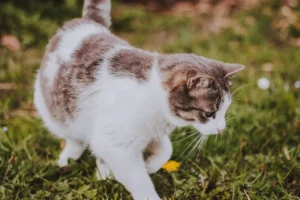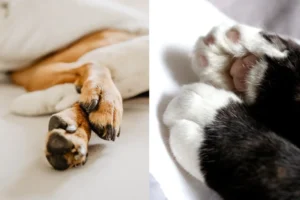Cats are known for their independent and sometimes mysterious behavior. One common behavior that some cat owners may experience is their feline friend stalking them around the house. But why do some cats exhibit this behavior towards their owners? Let’s explore the reasons behind why some cats stalk their owners and what it might mean.
Have you ever wondered why your cat follows you around like a silent shadow? Some cats stalk their owners as a form of hunting behavior. This behavior may be triggered by their natural instinct to hunt and capture prey, with their owners becoming the target of their stalking. Understanding this primal behavior can help cat owners better comprehend their feline companion’s actions.
Seeking Attention or Interaction
Some cats may stalk their owners as a way to seek attention or interaction. This behavior can stem from a desire to engage with their favorite human or to simply get more love and affection. When your cat follows you around the house, it may be their way of showing that they enjoy your company and want to be near you.
To encourage positive behaviors in your cat, try setting aside dedicated playtime each day. Engaging in interactive play sessions with toys like feather wands or laser pointers can help fulfill your cat’s need for mental and physical stimulation, which may reduce their stalking behavior. Additionally, make sure to provide enriching environments with climbing structures, hiding spots, and scratching posts to keep your cat entertained and satisfied.
Remember, positive reinforcement is key when dealing with stalking behavior. Reward your cat with treats or praise when they exhibit appropriate behavior, such as sitting calmly near you instead of constantly following you around. By reinforcing good behavior, you can help your cat understand the boundaries while still fostering a strong bond with them.
For more information on cat behavior and training tips, check out this comprehensive guide from the American Society for the Prevention of Cruelty to Animals (ASPCA): ASPCA Guide.
Playful Behavior
If your cat seems to be stalking you, don’t worry – it might just be looking for some fun! Cats are natural hunters, and stalking behavior can be their way of engaging in playful activities with their owners. This behavior mimics how they would stalk prey in the wild, showing their playful and curious side. To encourage this behavior, try engaging in interactive play sessions with toys like feather wands or laser pointers. Providing mental and physical stimulation can help satisfy your cat’s natural instincts to stalk and pounce.
Territory Marking
When your cat stalks you, it may also be a way for them to mark their territory and establish boundaries within your home. Cats are territorial animals, and by stalking you, they are asserting their dominance and claiming ownership over their space. This behavior can also be a sign of affection, as they feel comfortable and secure in your presence. To help your cat feel more secure in their territory, provide them with plenty of vertical spaces like cat trees or shelves where they can perch and survey their surroundings. By giving them a sense of ownership and control, you can reduce their need to stalk you for territorial purposes.
Additional Unique Insight:
- Cats may also stalk their owners as a way to seek attention or affection. By observing your daily routines, they learn when to expect interaction and may stalk you to initiate play or cuddle time. Ensuring you set aside regular quality time to bond with your cat can help minimize stalking behavior, as they feel more satisfied and fulfilled in their relationship with you.
Anxiety or Stress
Have you ever noticed your cat following you around the house like a stealthy little spy? Well, that could be a sign of anxiety or stress. Cats may stalk their owners as a way to seek reassurance and comfort when they are feeling overwhelmed. Changes in routine, new environments, or even other pets in the household can trigger this behavior in sensitive kitties. It’s like they’re saying, “Hey, I need you to make me feel safe.” So, the next time Mr. Whiskers is keeping a close eye on you, consider whether something might be stressing him out.
Ways to Address Stalking Behavior
If your feline friend has turned into your shadow, there are some paw-sitive ways to address and manage this stalking behavior. First off, try creating a safe space for your cat where they can retreat and relax. This could be a cozy corner with their favorite blanket or a tall cat tree for them to perch on. Providing plenty of mental and physical stimulation through interactive toys and playtime can also help reduce stress and distract them from fixating on you. Additionally, consider consulting with a veterinarian or an animal behaviorist for further guidance on how to help your cat feel more secure and less inclined to stalk you.
- Establish Routine: Cats thrive on consistency, so establishing a daily routine can help alleviate anxiety and reduce stalking behavior.
- Provide Hiding Spots: Creating hiding spots around the house gives your cat a sense of security and a place to retreat when they feel overwhelmed.
- Interactive Play: Engaging your cat in interactive play sessions can help redirect their focus and energy away from stalking behavior.
- Consider Environmental Enrichment: Enriching your cat’s environment with scratching posts, puzzle feeders, and interactive toys can stimulate their mind and reduce stress.
- Consult Professionals: If stalking behavior persists despite your efforts, seeking guidance from a veterinarian or animal behaviorist can help identify underlying issues and develop a tailored plan for your furry friend.
Remember, understanding why your cat is stalking you is the first step to helping them feel more at ease in their own whiskers.
Creating Enrichment and Engagement
Providing mental and physical stimulation is crucial in preventing stalking behavior in cats. Interactive toys, scratching posts, and regular play sessions can keep your feline friend engaged and satisfied. Rotating toys and introducing new activities can prevent boredom and reduce the urge to stalk. Remember, a stimulated cat is a happy cat!
Interesting Fact: Cats’ Stalking Behavior in the Wild
In the wild, stalking behavior is vital for hunting and survival. Cats rely on their instincts to stalk prey effectively. This behavior can sometimes carry over to domestic settings, where cats may exhibit stalking behavior towards their owners. Understanding this natural instinct can help owners appreciate their cat’s behavior better and empathize with their need for mental stimulation.
Additional Unique Insight:
Cats often stalk their owners out of boredom or a need for attention. By enriching their environment and building a bond through interactive play, you can help redirect this behavior in a positive direction. Offering puzzles or hiding treats can also engage their hunting instincts in a constructive way.
Alex, a passionate animal lover, has experience in training and understanding animal behavior. As a proud pet parent to two dogs and three cats, he founded AnimalReport.net to share insights from animal experts and expand his knowledge of the animal kingdom.









